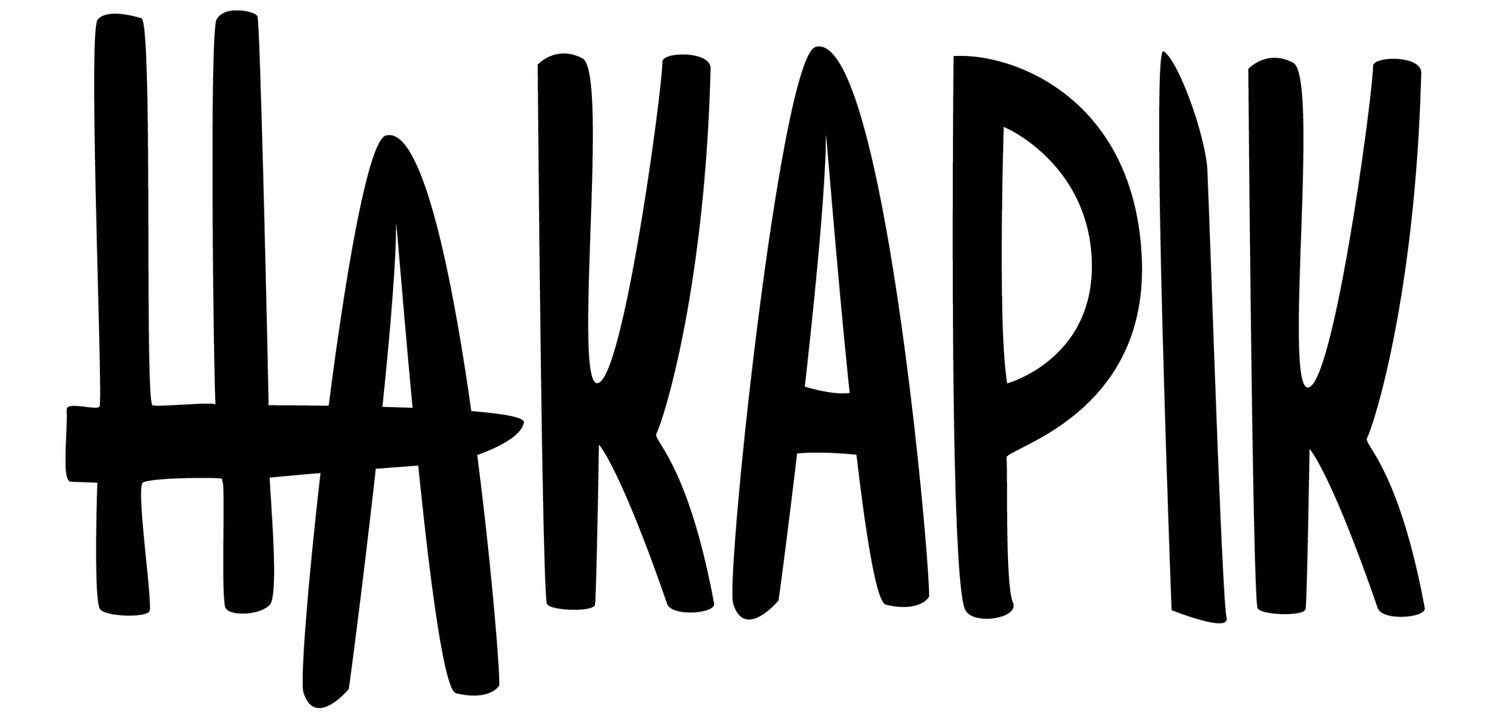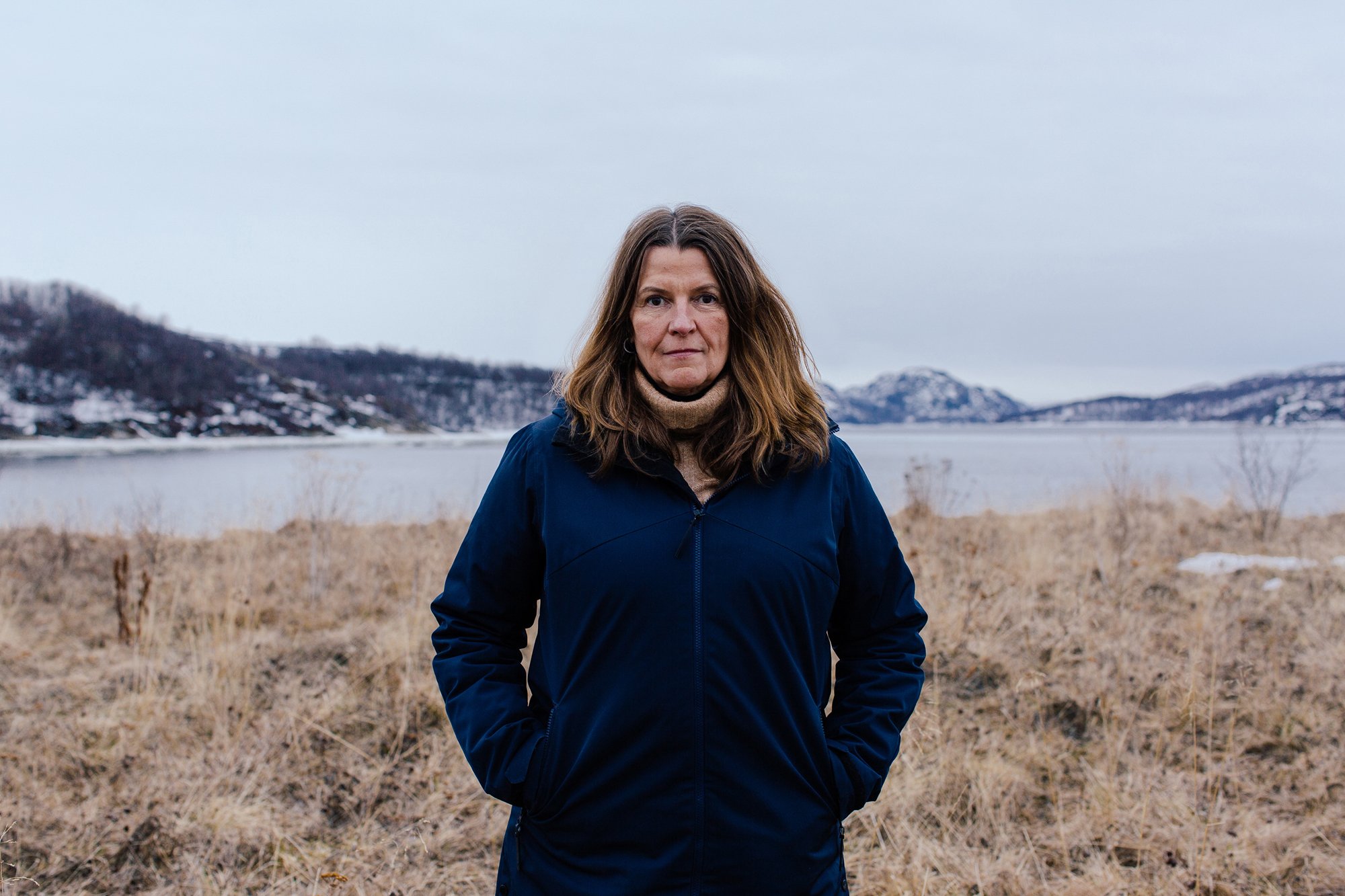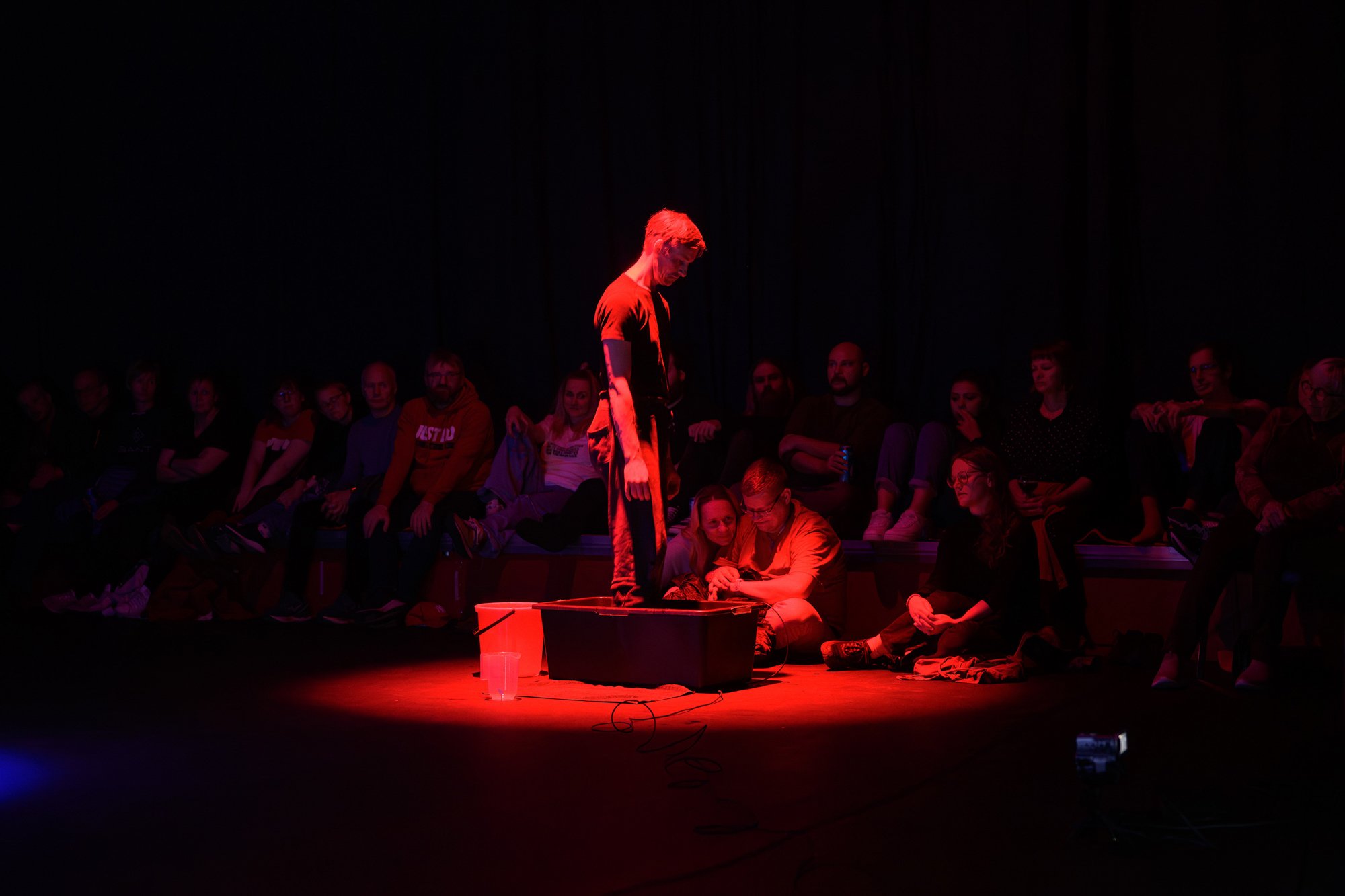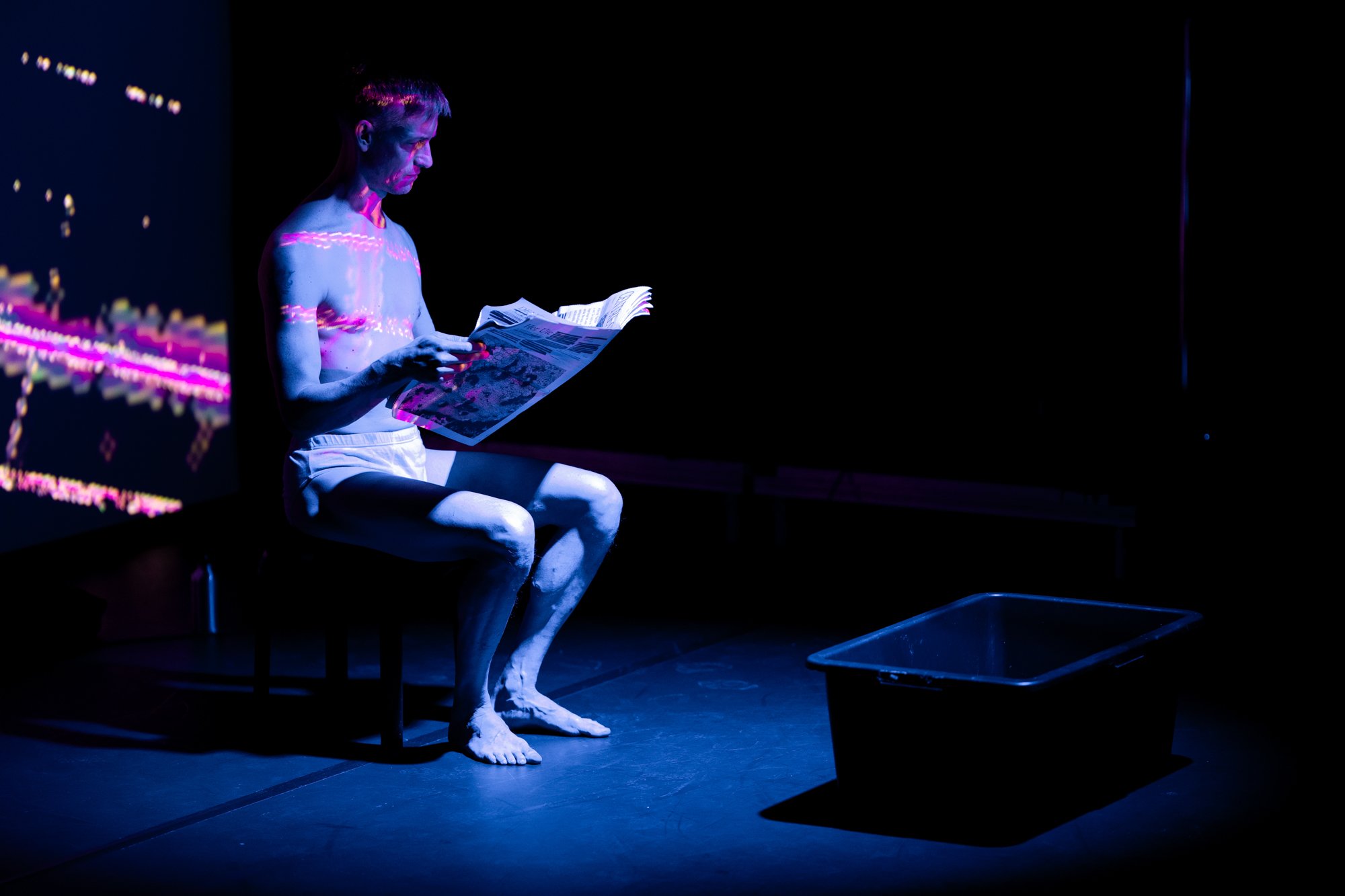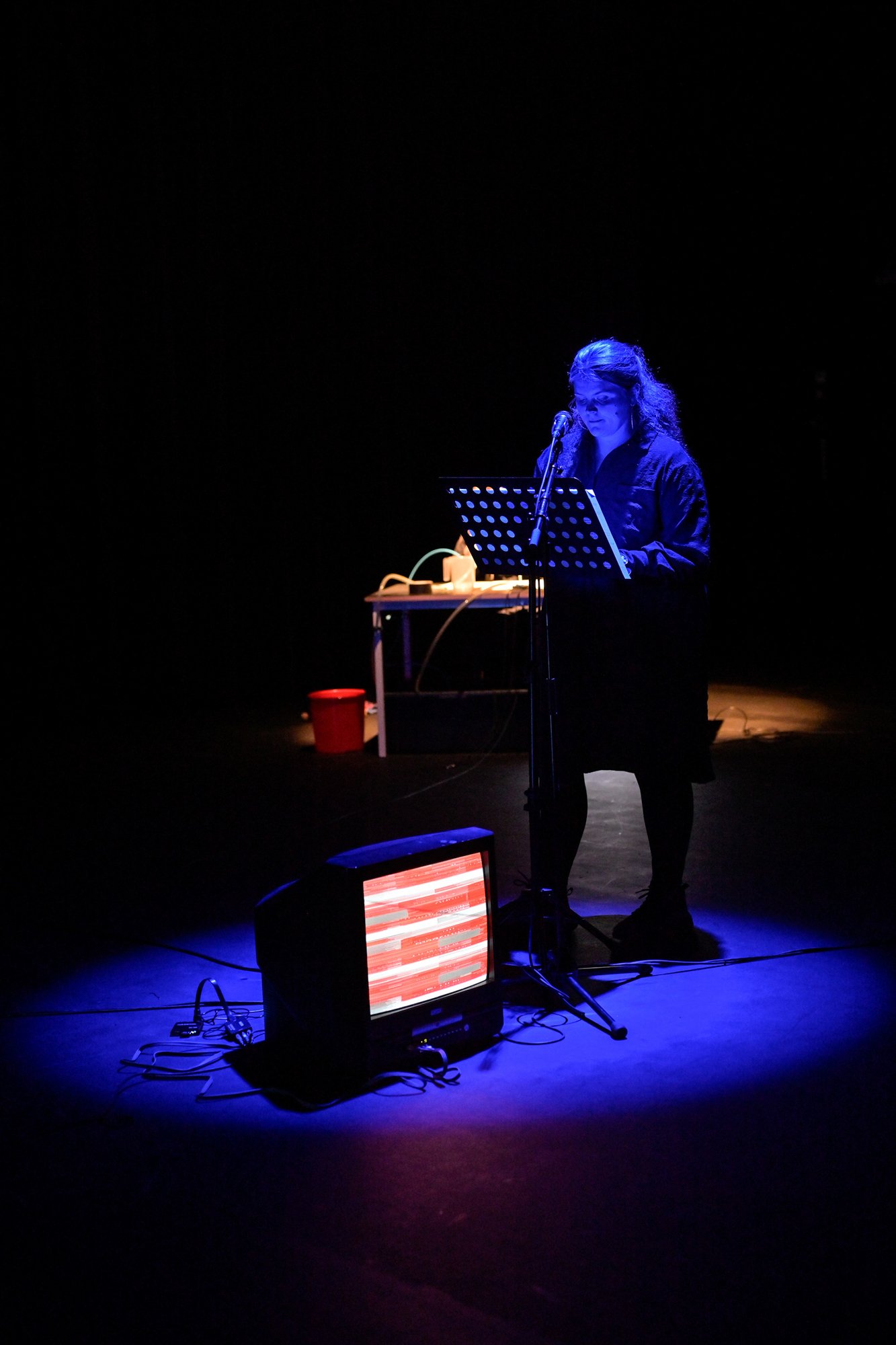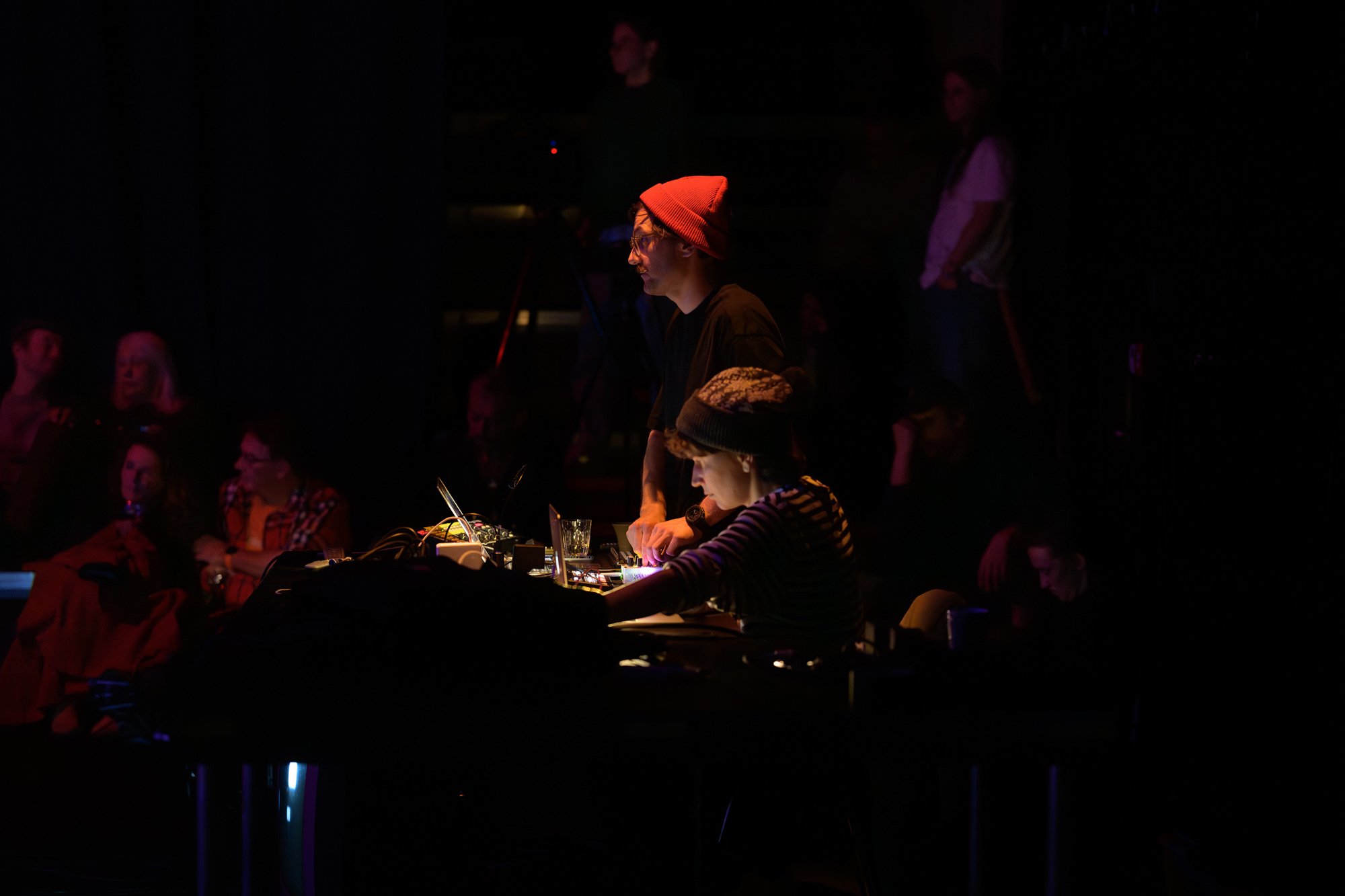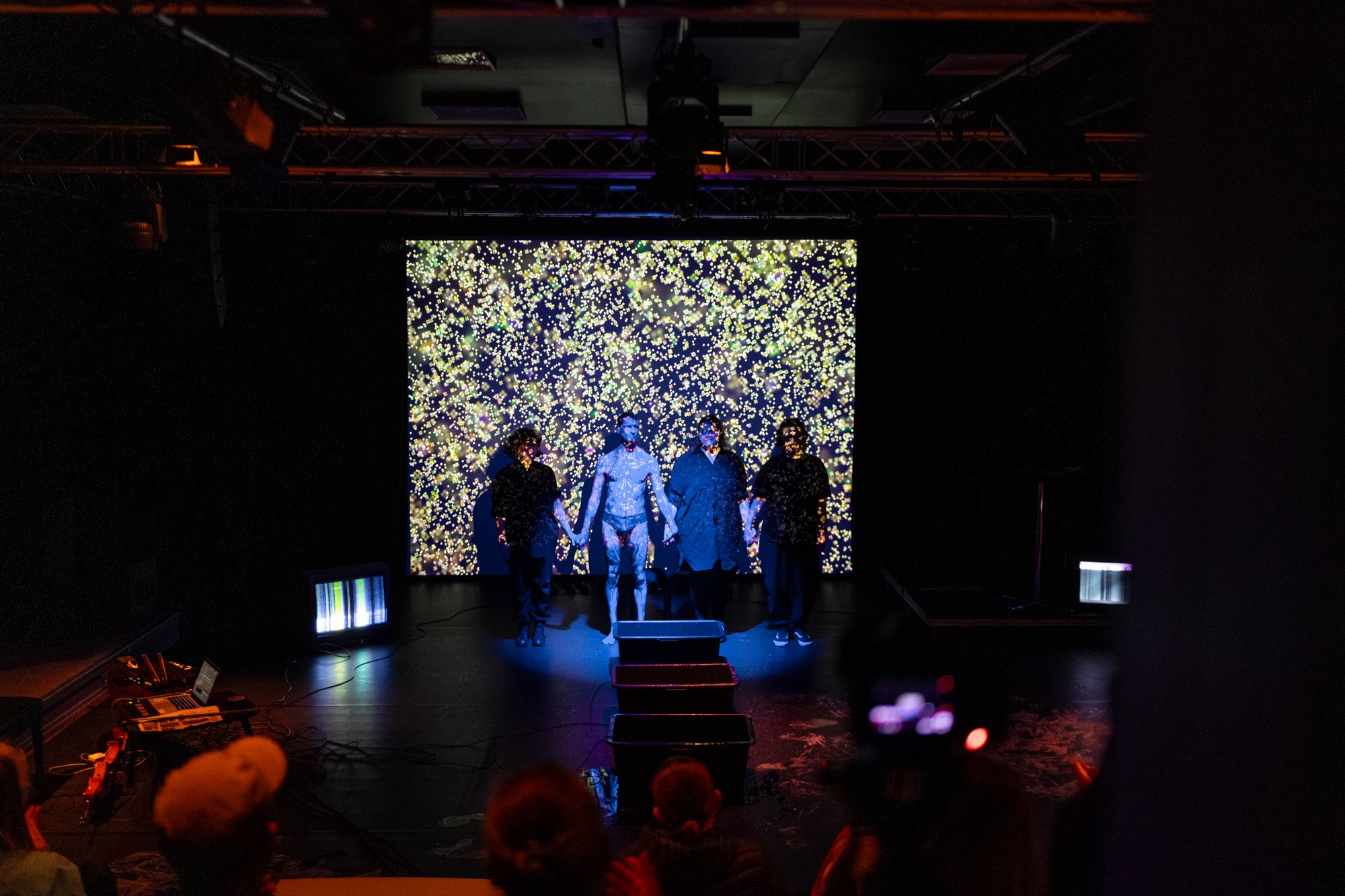Samovar Theater: Transition after 30 years of undistorted image
Interview with Bente S. Andersen (b.1964), artistic and stage director, founder of Samovar Theater, international performing arts company, Kirkenes 2024.
Artistic director Bente S. Andersen talks about Samovar Theater, cross-border relationships, the audio visual performance Transitions / Distortions which Samovar Theater is presenting at Vårscenefest 2024 and the importance of art in dark times.
By Zhanna Guzenko
Inspired by the theatre world, back in the 80s Bente S. Andersen went to Copenhagen to study in the Danish theater academy without any intention of coming back or envisioning herself taking a leading role in building international bridges. After her graduation, life offered her the chance to start a theatre in her home town in Kirkenes. Full of curiosity, and inspired by the people around her and the place itself, Andersen gathered all the forces she could and created a new theater in 1990: Samovar Theater. Off to a blazing start, she continued collecting and telling stories from the North throughout the years, and is still the artistic and stage director of this ambitious theater.
Samovar Theather became one of the pioneers of the Barents cooperation commissioners in Northern Norway, which from the beginning had a focus on the geographical location of Kirkenes and its proximity to the borders of Russia and Finland. Inspired by international politics, it has been conveying stories from this border area by giving them an artistic form and bringing them onto the stage. Samovar means «self-boiling,» which reflects what the theater has been doing, constantly simmering with ideas and producing original material. According to Telemarksforskning's annual culture index of 2022, Sør-Varanger is the best municipality in the performing arts category – and no doubt Samovar Theater played an essential role in this rating.
Transition as a forced change
This spring, Samovar Theater will be bringing their audiovisual performance Transitions/Distortions to Vårscenefest in Tromsø. I had the opportunity to see a version of the work-in-progress presentation during Kulturnatta in Kirkenes last year. Later I met with Andersen to talk about this fascinating piece of art, cross-border relationships and the importance of art in dark times. Our conversation started around Samovar’s mission.
– During all these years, working with people from different border areas in Europe and also West Asia and Middle East, it has always been a goal to create a safe space to produce art in. We have always made performances based on new written material. And if you want to reflect or make art in society, there is always politics involved somehow. As a human being, I find myself influenced by the things that are going wrong around us. I guess everyone does that, says Andersen.
In the last two years, the geopolitical changes and deterioration of diplomatic relations and the shift in national priorities have particularly affected the Sør-Varanger county, which has been one of the bridges between West and East. Now all border-related cultural institutions that were founded here, and developed, during the prosperous time of international relationships – at the zenith of the Barents cooperation – are now searching for a new path.
– After the sudden stop in 2022, it was like the curtain fell down. I have been thinking a lot about that, what is the difference? Why do I feel that it is such a loss? I don't think it's just about us here in Kirkenes or in Samovar. I think it’s about people, especially in East-Finnmark, who feel the same loss somehow. In our theatre, we now focus on including small local communities that are much closer to the work we are doing. We are planning to dig into small communities to find out how they develop: How do they think about the world today? What do they think about their society? We live in a border area, which is close to Finland and Russia, but if you live in Kjøllefjord, you are on another borderland between the ocean and the land, which also can be a really tough co-living space.
In addition, Samovar Theatre has also been important for children and youths, developing programs for them since 1991.
– We traveled and worked in many countries, and I know that kids are still connecting with their friends in Russia, Finland, Iceland and so on. And I think we should keep doing this. Because, hopefully, especially in the border areas, human beings won’t become too crazy in their heads.
An opportunity to open up
Transitions/Distortions is one of the recent works produced by Samovar Theater and addresses the topic of how the media has become a poisonous environment. The audio-visual performance presents an overarching picture of a transformation process and the necessity to broadcast higher interests of humanity, especially during strong political pressure and changes. The theme of transition is familiar to Samovar today, since the organisation itself is also in a period of transformation. The old models no longer work, and the new ones have not yet been put in place. Thus an idea of a change, or an attempt to test new formats, has already emerged within the theater.
– Recently so many changes have taken place. Now I’m talking about Kirkenes, where on one side there is a demonstration to mark the second year of the Russian invasion of Ukraine, and on the other side of the road there’s the Russian Consulate. And if you go a bit further, there is a street commemorating Navalny. I’m asking myself, how can all these elements fit together in my head? Every year we have a group session in the theatre where we ask each other what we want to do this year. Recently, I asked one of my oldest colleagues, Nikolay Schetnev, about his artistic plans. I got an honorable answer: «Well, I'm not sure what I want to do. I have to find myself again», he said. And I really understand that, because we all have to find ourselves again.
In Transitions/Distortions the dancer and choreographer Nikolay Schetnev portrays the most exposed character. During the performance, Schetnev’s character frequently changes his position, maneuvering and interacting with different objects on stage, trying to find his own way. His character is lost and exhausted under the continuous pressure of the media empires that he is surrounded by. Besides him, the most steady-going character, played by actress and performer Siri Anna Engzelius Strøm, is broadcasting a constant speech of today’s news, pop-culture phenomena, advertisement as well as excerpts from recently published report of the Norwegian Defence Commission and brings this all to the point of absurdity. Sometimes she tries to find a gentler tone while delivering hardcore news or screams and hammers the media space. Through her broken voice it is hardly possible to understand anything. There are only phrases taken out of context that are imprinted in the consciousness of the audience.
– There is an opportunity now for the theater to open up its stage. We want to invite artists and companies from all over Norway for collaborations. Firstly, it’s fun to think of having a model of shared economy in the art field. Secondly, I want the artists or companies we are going to work with to visit the small communities in East-Finnmark. It's about building bridges and reminding us that we are all in the same country. If we go to Vardø, the history of this place is really special. Now it's just a very small island with concerns over the military, but it used to be a very rich community because of the fishing and trading. And the fish is still there, but someone else is coming to take the fish, and the money goes straight down to the south, which makes the local economy very weak . People know this. It is a very interesting topic to discuss and I think we really need to do it now.
Missing the truth
Transitions/Distortions performance resonates vibrantly. On stage the two sound artists Per Anders Store and Marina Karpova are taking control of the sound flow, mixing the incoming signals and processing it very carefully. Each of them has their own role in sound manipulation.
The least visible character is Nikolay Korostel, a radio amateur debuting on this performance. He works at his own station on the stage’s side, equipped with a radio receiver, morse code machine and commutators. Ahead of the show he built a 5-meter antenna at the emergency exit of the theater. On stage, Korostel receives and transmits signals live, which adds a new layer to the entire performance; one gets a strange feeling that there’s something in the air. It feels almost like a call for help or something. The frisky jumping sound of the radio brings forward a feeling of resistance and the presence of a parallel world, not yet fogged by the information overdose.
Iridescent vertical lines and glittering pixels of white noise are generated by visual artist 1999Q. We see a gigantic projected screen changing colors while it beautifully merges with the monotonous background information flow.
– It is a special time we are living in now, and I think we should try to dig into what is going on in our society. I find it very difficult to see. Harold Pinter – who received the Nobel Prize in Literature in 2005 and whom I agree with – said that it’s so difficult to find the truth in society because it slips through your fingers. When you think that you have found it, it goes away. And that’s kind of how I feel.
Transitions/Distortions conveys a sense of chaos as it surrounds us with information and a constant pressure of important messages on TV, official statements in combination with attempts to break through with sporadic radiowaves and white noise.
– Right now I think the whole world is in limbo. And Transitions/Distortions is also about this contradiction. It is again and again this non-stop flow of information and change of the rules.
Andersen then continues to speculate over what might happen if she got so tired that she wouldn’t want to do anything. It could happen – especially in this longstanding, utterly dark period. But then again art has always been a way of living for her. And driven by a sleepless curiosity, she now wants to find out how art can influence society – also in its darkest hour.
– Now of course there is all this distortion in Gaza. It’s crazy. And I can't understand how we can let that happen. I don't have any words left. I’m empty in a way. I’m questioning if there’s anything we can do with art in this situation. Is art important in these times? I do think that we need art to be this room where we can reflect. And this is the thing that we are going to do at Samovar – to have these discussions, to talk human to human. I think it is more important than ever. We do need art, we need to have art in every society, on every level.
The international prosperity of the last three decades in Sør-Varanger gave a sweet feeling of boundlessness, where politicians, artists as well as regular border crossers enjoyed and put their trust in the well-established transborder routine. Each side of the border learned about each other, developed and upgraded. But times have changed. Now, this bygone period of 30 years can only be recorded as experience and knowledge, imprinted in history. A new uncertain era has begun. And it is exactly when the reflection room will be the main guiding light.




